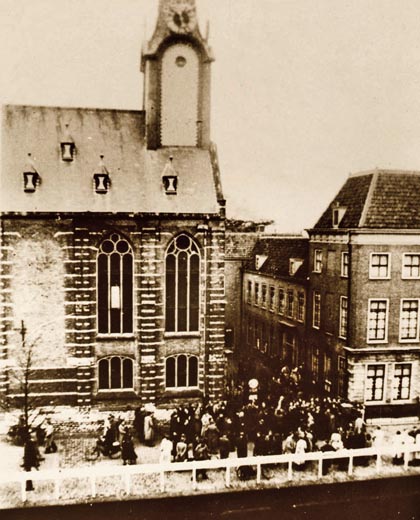
Cleveringa lecture to focus on Jewish Professor Meijers
Historian Marjan Schwegman is the new Cleveringa Professor. Her lecture on 27 November will focus on Eduard Meijers, the Jewish professor who was dismissed by the Nazis. Schwegman's previous posts include Director of the NIOD Institute for War, Holocaust and Genocide Studies.
What is your lecture about?
‘I will be talking about the man who was the subject of the protest speech given by Professor Cleveringa, Dean of the Law Faculty: Eduard Meijers, Cleveringa's mentor, who had just been dismissed. Meijers is particularly known as the post-war founder of the new Civil Code of the Netherlands, but little attention is paid to him as a person in the remembrance culture surrounding the University in the Second World War and not even in Cleveringa's protest speech. We also know very little about how what happened to him during the war. After being dismissed by the Nazis, he was interned in the Westerbork camp and after that he ended up in Theresienstadt. I'm interested in why we pay him so little attention, and in my lecture I will talk about what happened to him during the war years.'

Why is it that we know so little about this period in his life?
‘There are a number of reasons for that, and it's something I'm still researching in the run-up to my lecture. There seems to have been some awkwardness about victims who survived the camps, by which I mean such death camps as Auschwitz. For some reason, in our remembrance culture, we prefer to pay attention to heroes like Cleveringa: and not only that, Meijers himself probably didn't want to be seen as a hero.'
What did Meijers himself say about his experiences in the war?
‘He may have talked about his experiences with his family, but in public he divulged very little about that time. His daughter Clara did give some information in the interviews I'm studying. I'm also reading diaries of Meijers' fellow inmates in Westerbork and Theresienstadt, such as the memories of Jewish teacher Gabriel Italie. The information is very fragmented and I'm trying to fit all the different pieces together.'
What do you believe is the significance of the annual Cleveringa lecture as a commemorative event?
‘The Second World War seems more topical than ever, given the heightened tensions throughout the world today. Just look at the nuclear threat surrounding North Korea, for instance. It all makes you realise how easily a local conflict can escalate until it becomes a world war. The rise of the populist parties also bring to mind the 1930s, and politics are being shaped by nger and frustration. What I think is missing is a positive future vision from contemporary politicians, although anyone who says that is dismissed out of hand as a naive do-gooder. Right now it's particularly important that we continue to remember the war.'
Marjan Schwegman (1951) is emeritus Professor of Political Culture in the 20th Century and was Director of the NIOS Institute for War, Holocaust and Genocide Studies from 2007 to 2016. Before that she was Director of the Royal Netherlands Institute in Rome. She previously worked as a lecturer in History at Leiden University.

Law Dean Rudolph Cleveringa delivered his famous speech on 26 November 1940 in the Academy Building protesting against the dismissal of his Jewish colleague and Professor of Private Law Eduard Meijers. The German occupiers had decreed that all 'non-Arian persons' should be relieved of their position. Cleveringa's speech led to a strike among the students, after which the Nazis closed the University.
The Cleveringa chair is a rotating professorship for the period of a year. The Cleveringa professor focuses either on the Second World War or on issues relating to the law, freedom and responsibility. Previous holders of the chair include Vice-President of the Council of State Piet Hein Donner, the historians Carol Gluck, Michael Ignatieff and Hans Blom, Job Cohen, former Mayor of Amsterdam and professor by special appointment in Leiden, and President of Médecins sans Frontières, Joanne Liu.
(LvP)
